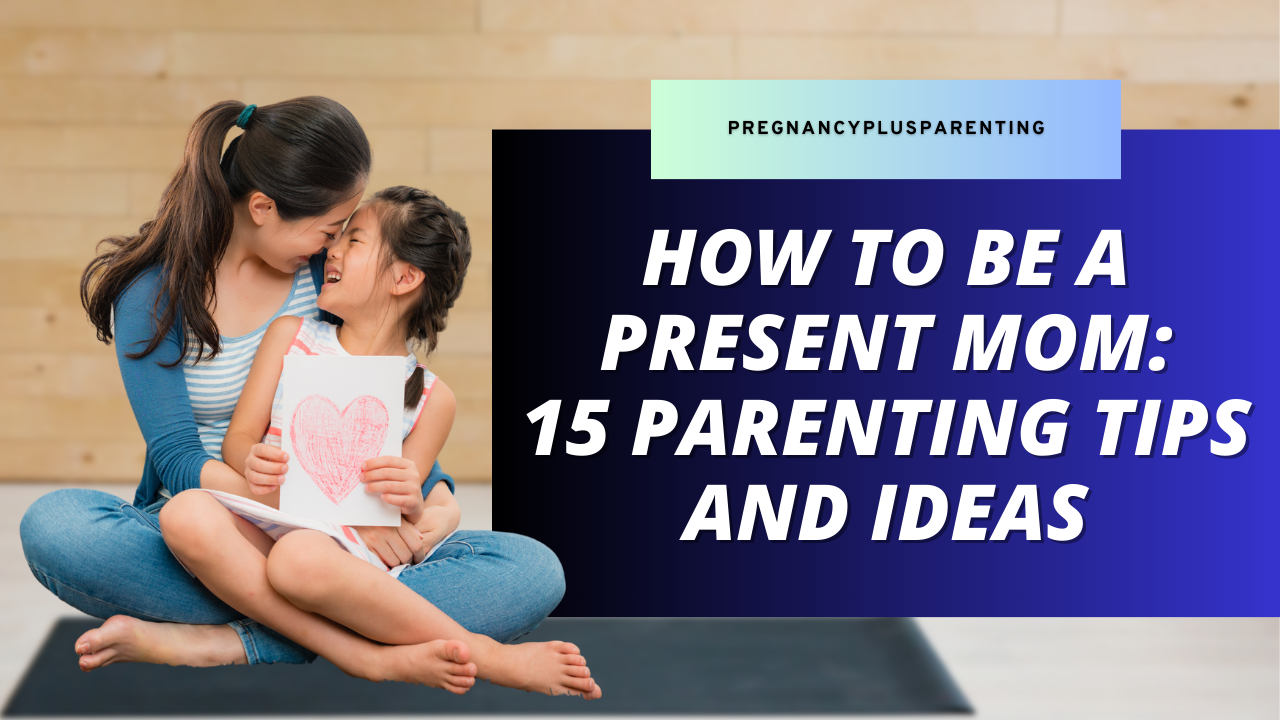How To Be a Present Mom: 15 Parenting Tips and Ideas
Being a present mom means actively engaging with your child and creating a nurturing environment where they feel valued and loved. In today’s fast-paced world, distractions can make it challenging to stay fully engaged, but with intentional effort, you can strengthen your bond with your child and enhance their emotional well-being. Here are 15 actionable tips and ideas to help you become a more present and involved parent.
1. Prioritize Quality Time
Spending quality time with your child is one of the most effective ways to be present. It’s not about how much time you spend but how you spend it.
- How to Do It:
- Dedicate daily moments to be with your child without distractions.
- Engage in activities they enjoy, like reading, playing, or simply talking.
- Use meals as an opportunity to connect.
2. Put Away Digital Devices
Technology is one of the biggest barriers to being present. Setting boundaries with devices ensures your focus remains on your child.
- How to Do It:
- Create “device-free” zones during family time.
- Turn off notifications during key bonding moments.
- Lead by example by limiting your screen time when with your child.
3. Practice Active Listening
Listening is a powerful way to show your child that they matter. Be attentive and make them feel heard.
- How to Do It:
- Maintain eye contact when your child is speaking.
- Avoid interrupting or multitasking during conversations.
- Repeat or paraphrase what they say to show understanding.
4. Create Routines and Traditions
Children thrive on predictability and consistency, and shared routines foster connection.
- How to Do It:
- Establish daily rituals like bedtime stories or morning cuddles.
- Celebrate small traditions, such as Sunday pancake breakfasts or movie nights.
- Involve your child in planning these routines to make them feel included.
5. Be Fully Present During Playtime
Play is how children express themselves and learn. Engaging wholeheartedly in their play activities strengthens your bond.
- How to Do It:
- Let your child lead the activity and join in enthusiastically.
- Avoid distractions and focus on the shared experience.
- Use imaginative play to connect with your child on their level.
6. Validate Their Emotions
Acknowledging your child’s feelings, whether big or small, helps them feel understood and secure.
- How to Do It:
- Use phrases like “I understand why you feel that way” or “It’s okay to be upset.”
- Help them label their emotions to build emotional awareness.
- Avoid dismissing or minimizing their concerns, no matter how trivial they seem.
7. Practice Mindful Parenting
Mindfulness helps you stay focused on the present moment, reducing stress and increasing patience.
- How to Do It:
- Take a few deep breaths before responding to your child during challenging moments.
- Engage your senses when spending time with your child—notice their laughter, expressions, and words.
- Practice gratitude by reflecting on the positive moments you’ve shared.
8. Offer Undivided Attention
Multitasking can make your child feel unimportant. Focusing solely on them during interactions strengthens your relationship.
- How to Do It:
- Schedule specific times to be with your child without interruptions.
- Set boundaries for work and chores during family time.
- Communicate your availability to ensure they know they have your full attention.
9. Be Involved in Their Interests
Showing genuine interest in your child’s hobbies and passions makes them feel valued.
- How to Do It:
- Attend their games, performances, or recitals.
- Learn about their favorite shows, books, or activities to engage in meaningful conversations.
- Encourage and support their exploration of new interests.
10. Teach Through Everyday Moments
Everyday life offers countless opportunities to teach and connect with your child.
- How to Do It:
- Use meal preparation to teach basic cooking skills.
- Involve them in household chores and make it a fun learning experience.
- Share stories or lessons from your own life to inspire and guide them.
11. Stay Calm During Conflict
Conflict is inevitable, but how you handle it can strengthen or weaken your bond. Staying calm demonstrates respect and emotional control.
- How to Do It:
- Take a moment to pause before reacting during disagreements.
- Use “I” statements to express your feelings without blaming.
- Teach problem-solving skills by working together to find solutions.
12. Celebrate Their Achievements
Recognizing your child’s accomplishments, no matter how small, boosts their confidence and sense of self-worth.
- How to Do It:
- Praise specific actions, such as “You worked so hard on that project, and it turned out great!”
- Display their artwork or achievements around the house.
- Celebrate milestones with simple gestures, like baking their favorite treat.
13. Encourage Open Communication
Creating a safe space for your child to express themselves fosters trust and deepens your connection.
- How to Do It:
- Ask open-ended questions to encourage thoughtful responses.
- Avoid being overly critical or judgmental during conversations.
- Be approachable, so they feel comfortable sharing their thoughts and concerns.
14. Be Playful and Spontaneous
Injecting fun and spontaneity into your relationship keeps things light-hearted and joyful.
- How to Do It:
- Surprise your child with impromptu activities, like a dance party or picnic.
- Use humor to connect and create a relaxed atmosphere.
- Join in silly games or challenges, showing them that you can let loose too.
15. Show Yourself Compassion
Being a present mom doesn’t mean being perfect. Practicing self-compassion helps you be a better parent by reducing stress and burnout.
- How to Do It:
- Acknowledge that it’s okay to have off days.
- Take time for self-care to recharge your energy and focus.
- Seek support from friends, family, or parenting groups when needed.
Why Being Present Matters
Being a present mom creates a foundation of trust, love, and emotional security for your child. It fosters:
- Stronger Bonds: Spending intentional time together deepens your connection.
- Improved Behavior: Children who feel valued are less likely to act out for attention.
- Enhanced Development: Engaging in meaningful interactions supports cognitive and emotional growth.
Overcoming Challenges to Being Present
Life’s demands can make being present difficult, but overcoming these obstacles is possible with effort:
- Time Constraints: Focus on short but meaningful interactions if your schedule is tight.
- Work Stress: Establish boundaries between work and family time.
- Emotional Burnout: Prioritize self-care to maintain emotional availability.
Conclusion
Being a present mom is about more than just being physically there; it’s about engaging with your child in meaningful ways. By practicing active listening, prioritizing quality time, and showing love and validation, you can nurture a deep and lasting bond. Remember, perfection isn’t the goal—presence is.
Start implementing these 15 tips today, and watch your relationship with your child flourish, creating a foundation of love and connection that will last a lifetime.






